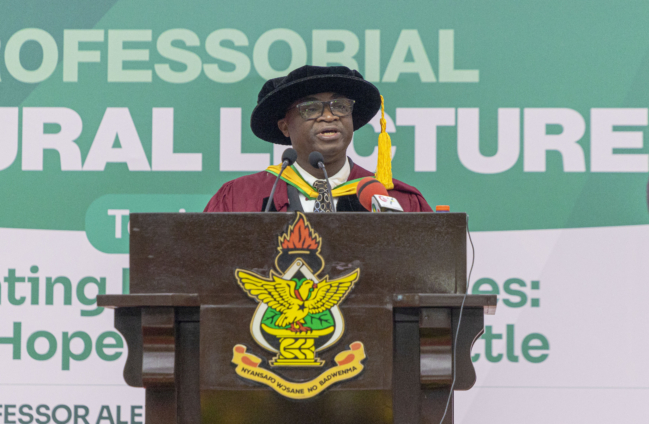
Audio By Carbonatix
KNUST Parasitologist, Professor Alexander Yaw Debrah has emphasized the importance of prioritizing Neglected Tropical Diseases (NTDs) control within national health plans.
Speaking at his professorial inaugural lecture, he stressed that adequate funding should be allocated for NTD control programs, including surveillance, treatment, and research.
"Local and endemic country governments, including the government of Ghana, must commit some percentage of health funds to fight NTDs," he stated.
The lecture, themed "Eliminating filarial diseases: A new hope for an old battle," highlighted how local and collaborative partnerships have led to combating filarial diseases in Ghana. It also covered the development of human and infrastructure capacities to sustain research and control efforts.
While advocating for the inclusion of elephantiasis patients in the National Health Insurance Scheme (NHIS), Prof. Debrah urged the government to allow victims to benefit from the Livelihood Empowerment Against Poverty (LEAP) program.
"LEAP is a social protection intervention of the Government of Ghana aimed at reducing extreme poverty among the poorest and most vulnerable in Ghana. Our research data shows that the little help we gave to the patients actually improved their quality of life. If the government extends LEAP to elephantiasis patients, it will definitely improve their quality of life," he asserted.
Professor Debrah also highlighted the need for regular assessments to ensure the effectiveness of interventions.
"Our experiences from the Yaws Eradication Program and other NTD programs, both local and international, teach us that the last 1% of patients left is as equally important as the first 99% we successfully treated. Therefore, we should be very careful not to close the books on 'eliminated NTDs.' If you are certified to eliminate a disease, it does not mean it is completely eradicated from the country. It means it is no longer a public health threat. However, if care is not taken, recrudescence can set in, and fighting to control it will be very difficult due to factors such as donor apathy and disengagement," he explained.
As digital technology continues to grow, Prof. Debrah called for expanding the use of digital and mobile technologies by community health volunteers (CHVs) to identify new and old cases.
A crucial part of his recommendations is fostering collaboration among policymakers, researchers, academic institutions, international communities, and public-private partnerships to eliminate NTDs.
Latest Stories
-
Solpower marks new milestone in Ghana’s clean energy journey with 859 kWh Solar Project for Sintex Ghana
7 minutes -
Do not fear exercise over rare heart risks – Prof Nicholas Osei-Gerning OBE
10 minutes -
Traders say tomato prices likely to stabilise gradually despite recent supply shocks
26 minutes -
Affordability determines access to timely treatment in Ghana – Prof Nicholas Osei-Gerning
27 minutes -
Tomato traders warn drivers over ‘red zones’ on Burkina Faso route after deadly attack
31 minutes -
Hearts of Oak: laggards in the GPL title chase
31 minutes -
Roman Ridge School sets new QCEC record with 364 medals
32 minutes -
Award-winning photographer Tolani Alli brings photography masterclass to Ghana
39 minutes -
World Series 2026: Ghana’s Para Swimming debutants end campaign with personal bests
46 minutes -
Education ministry condemns student violence in Swedru, orders GES probe
50 minutes -
Small businesses, residents lament impact of power fluctuations in Achimota, Tantra Hills
1 hour -
See the areas that will be affected by ECG’s planned maintenance this week (Feb 22-28)
2 hours -
All injured students stable after Swedru clash —GES
3 hours -
GPL 2025/26: Karela United beat Eleven Wonders 2-0 to maintain unbeaten run
3 hours -
Crime trends in schools will worsen if preventive systems aren’t modernised —Kofi Tonto
3 hours

